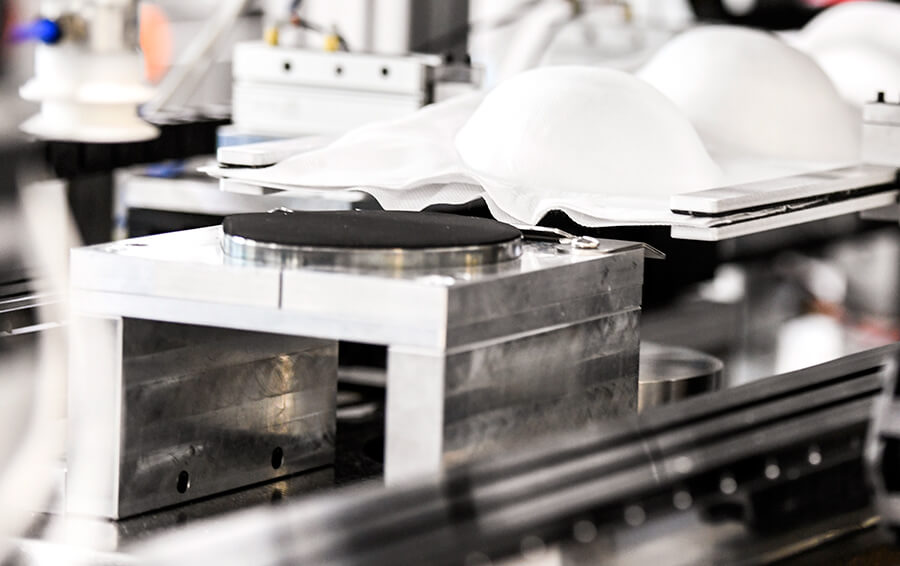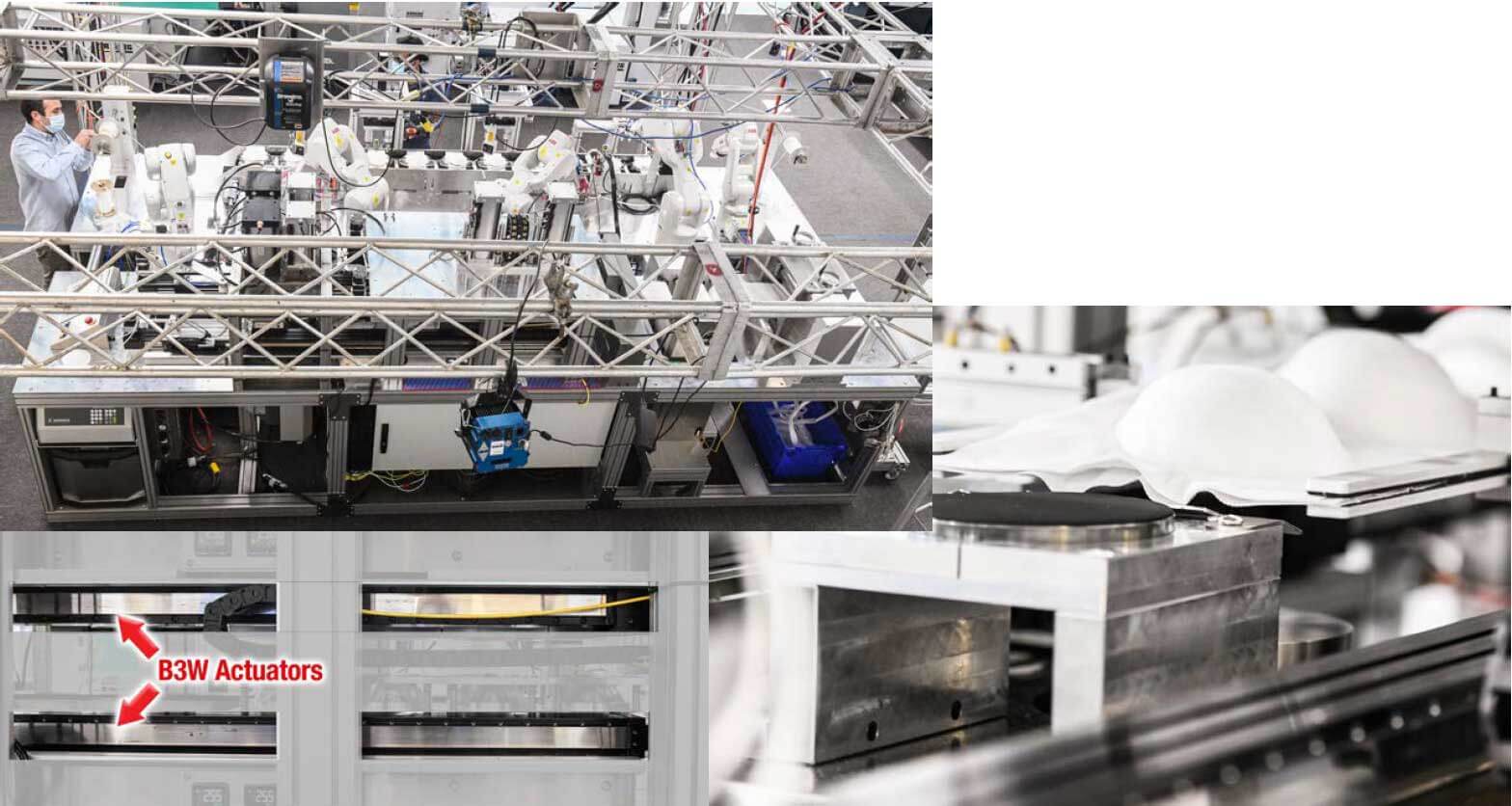Fast and flexible: How to design a mask-making machine
By Andrew Zaske on February 2, 2021
 Responding to the need for PPE for medical personnel
Responding to the need for PPE for medical personnel
When the pandemic hit hard in March 2020, a New York City-based manufacturer applied its expertise to an area of greatest need: making face masks for front line medical personnel. Within a matter of weeks, the company had developed an innovative mask workcell prototype, a development process that usually takes months. That’s how Boyce Technologies Inc. (BTI) works. The company specializes in going from concept to product in the blink of an eye by manufacturing standards.
Fast response and flexible product solutions is a Tolomatic operating philosophy, too. This compatible philosophy meant that Tolomatic could provide a wide variety of electric linear actuators quickly and in the required configurable lengths and options. Another plus is that Tolomatic is located in the United States. BTI wanted to work with U.S. partners to build a machine made with U.S. parts for better quality, delivery and technical support.
BTI’s success is due in large part to its vertically integrated structure. It is also the reason the company can act quickly. Engineering, prototyping and manufacturing are integrated into one state-of-the-art facility. BTI makes much of its own equipment and components, from dyes to circuit boards.
The goal was to design a maskcell that is small, fast and flexible. Existing machines were large, expensive and single-purpose, requiring lots of space and it took a long time to get one. “With new technology, we knew we could make a nimble machine with high-capacity throughput on a small footprint for a much lower cost of ownership compared to the big machines,” said Tom Powell, vice president of Business Development, BTI. “We needed something highly configurable that would fit in as small a space as possible.”
The next-generation, custom-built, material-handling machine is expected to be FDA-approved and optimized to make a mask every few seconds, 24/7.
Tolomatic in-step with fast-response approach
The mask-making machine is based on the automated workcell concept to improve efficiency, quality and throughput. A primary goal is to maximize output with the smallest footprint and fewest workers as possible.

The machine has three primary stages: 1) material feed; 2) form and cut; 3) assemble and finish. From the initial material infeed and transfer station, the machine performs operations for form pressing, cutting and fabric welding. From there, the formed masks move to the assembly stations, where straps and nose pieces are cut, shaped and added to the mask molds. Final stations are for quality control inspection and packaging.
The machine’s state-of-the-art motion control components – actuators, robots, PLCs, servo motors, conveyors and EtherNet IT-based communication – provide the nimbleness and speed required for fast and accurate throughput. Robotic assembly and an automated production line allow the machine to easily adapt to different requirements.
Linear motion components
More than a dozen different Tolomatic electric actuators create the required linear motion to move, form, index, cut and assemble the fabric into masks. The actuators, selected according to requirements for force, load, speed, orientation and more, are stroke- configurable standard products, with flexible mounting and configuration options.
Each actuator is also sized with a motor mount specifically to fit Teknic servo motors. Motor dimensions are pre-loaded in Tolomatic’s ‘Your Motor Here’ configurator, so the ordering and delivery of these units was very fast. Using the correct motor mount takes away the interface challenges and simplifies set-up.
 At the first station, a Tolomatic B3W rodless belt-drive actuator moves and supports the material (in photo, these are the horizontal bars, top and bottom of mask former). The actuator pulls in the sheet of heavy material and then supports a heated form press that comes down on top of the sheet. It’s a large platform, so the actuator must provide high moment-loading capabilities as well as support and carry 100 pounds of weight from the press. The entire unit, including the internal carriage support and bearings, is completely sealed—there are no external guides—so this type of actuator design helps prevent fabric particulate from getting inside the actuator and eventually clogging up motion.
At the first station, a Tolomatic B3W rodless belt-drive actuator moves and supports the material (in photo, these are the horizontal bars, top and bottom of mask former). The actuator pulls in the sheet of heavy material and then supports a heated form press that comes down on top of the sheet. It’s a large platform, so the actuator must provide high moment-loading capabilities as well as support and carry 100 pounds of weight from the press. The entire unit, including the internal carriage support and bearings, is completely sealed—there are no external guides—so this type of actuator design helps prevent fabric particulate from getting inside the actuator and eventually clogging up motion.
At the second station, a Tolomatic B3W rodless belt-drive actuator also provides fast positioning in the move-and-support function, this time to support a press that cuts and welds the masks. The B3W rodless actuator can move at speeds up to 200 inches per second and support large moment loads to help facilitate production cycle times.
At the third station, B3W actuators then move the pre-formed masks to an ABB robot, which grabs them and swings them to the other side of the table for assembly. Robots cut and apply straps, and glue, cut and apply nose pieces. Two Tolomatic GSA linear slide actuators assist in the ultrasonic welding function that applies loop elastic for placing around ears. The masks are then unloaded for packaging and shipping.
Looking beyond the pandemic
It was important to BTI that the machine be not only fast but also flexible. The machine can be easily modified to make different sizes of masks, such as smaller ones for children, and for different face sizes (think noses) and mask styles. Mask material can change, too – cotton or synthetic – as can strap material and length. “There’s no point in making a one-size-fits-all machine,” said Powell. “We built the machine so people can get what they want.”
BTI is also thinking beyond the COVID-19 pandemic. The workcell is designed so it can be adapted to make masks for a variety of medical procedures. BTI has already had requests for non-COVID masks and specialty masks.
“We are looking at a whole host of new products around masks to help doctors facilitate procedures they can’t do now. We see an emerging market for custom masks for specific procedures.”
Tolomatic has a very similar philosophy about manufacturing and response to these types of challenges to our world. As an essential business, with fast and configurable products, Tolomatic easily partners with companies like BTI to create the solutions needed for making masks, ventilators, new testing machines and other medical devices.
